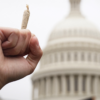Abner Schoenwetter had been in the commercial seafood business since 1986. Over the years, Schoenwetter built a successful company distributing seafood across the country, including lobster tails imported from overseas. As far as Schoenwetter knew, all of his business transactions were perfectly legal and he had no reason to believe that he or any of his business partners were breaking any laws. But at 7 a.m. one morning in 1999, armed agents from the FBI, IRS and National Marine Fishery Service (NMFS) showed up at his south Florida home with search warrants. The federal agents herded him, his wife, his mother-in-law and his daughter (all still in their night clothes) into the living room where they were told to sit and be quiet. A year later, Schoenwetter was sentenced to eight years in prison, three years of supervised release and fined over $100,000. His crime? Schoenwetter testified to the House Judiciary Committee last week:
No matter how you frame it, the truth is that I am a convicted felon who has just spent the last six years of my life in federal prison for entering into a contract to buy lobsters.
Specifically, the NMFS charged Schoenwetter with violating the Lacey Act, a law that makes it a crime for an American to take wildlife in violation of domestic laws or regulations. The law was intended to punish, for example, an American who killed an elephant in Kenya in violation of Kenyan wildlife protections. So what foreign regulations had Schoenwetter violated? Well, the NMFS claimed that the lobsters he had contracted to buy were in violation of three Honduran regulations: 1) they were in plastic bags, not cardboard boxes; 2) they were undersized; 3) some of them were egg-bearing lobsters. Despite the fact that this specific shipment was no different than any of the hundreds of other deals Schoenwetter had done over the years, despite the fact that Schoenwetter had never seen the lobsters in question and knew nothing of the Honduran regulations, and despite the fact that the Honduran Attorney General confirmed that the size regulation had never actually been signed into law and the Honduran Minister of Justice testified that the egg-bearing regulation was directed at turtles, not lobsters, Schoenwetter’s conviction was upheld.
The Daily Signal depends on the support of readers like you. Donate now
The injustice done to Abner Schoenwetter illustrates a very real problem that is currently undermining the civil liberties of all Americans. Between 2000 and 2007, Congress created 452 entirely new crimes, a rate of over one new crime every week. By the end of 2007, the U.S. Code included more than 4,450 federal crimes, with an estimated tens of thousands more located in the federal regulatory code. Civil liberties attorney Harvey Silvergate estimates that the average working American unknowingly commits Three Felonies a Day. Heritage Foundation Senior Legal Research Fellow Brian Walsh explained to last week’s Judiciary Committee hearing why this is happening:
Placing thousands of vague, overbroad criminal laws in the hands of government officials means that no one is safe from unjust prosecution and punishment. Many of these criminal laws punish conduct that the average person would not guess is prohibited. The body of criminal law thus fails to meet one of the primary requirements of due process: providing individuals with fair notice of what conduct can be punished criminally.
Since our nation’s founding, a core principle of our system of justice has been that no citizen should be subjected to criminal punishment for conduct that he did not know was illegal or otherwise wrongful. This principle is embodied in the requirement that, with rare exceptions, the government must prove a defendant acted with intent, or at least knowledge, before subjecting him to criminal punishment. Responding to this undermining of our nation’s founding principles and the need for major changes in how the federal government criminalizes behavior, a wide range of conservative, liberal, and independent organizations have joined forces to push back against arbitrary government rule. A similarly broad spectrum of organizations also supported last week’s congressional hearing on overcriminalization, including the American Bar Association, American Civil Liberties Union, Families Against Mandatory Minimums, The Heritage Foundation, Manhattan Institute, National Association of Criminal Defense Lawyers, and the National Federation of Independent Business.
In conjunction with NACDL, The Heritage Foundation released a report, Without Intent, in May recommending that Congress should: 1) Enact default rules of interpretation ensuring that mens rea requirements are adequate to protect against unjust conviction; 2) Codify the rule of lenity, which grants defendants the benefit of the doubt when Congress fails to legislate clearly; 3) Require adequate judiciary committee oversight of every bill proposing criminal offenses or penalties; 4) Provide detailed written justification for and analysis of all new federal criminalization; 5) Redouble efforts to draft every federal criminal offense clearly and precisely. In his opening remarks last week, Schoenwetter explained why he chose to testify now:
I’m not testifying here today to complain about my personal predicament or to seek publicity for my case. I simply wish to prevent other Americans from having to go through the same terrible ordeal that my family and I have had to endure. If I can help just one family avoid the pain and suffering of watching a loved one go to prison because of vague and overbroad laws, then I will consider my appearance here a success.
Quick Hits:
- Afghanistan’s government and the Taliban have begun talks over a negotiated end to the war.
- While speaking to Fortune magazine’s “Most Powerful Women Summit” Tuesday, the presidential seal fell off President Barack Obama’s podium.
- The White House released a misleading video last week on President Obama’s tax policy. Watch our version of the video, edited for accuracy.
- In their latest overseas sale, the state of Illinois paid higher yields than Mexico for their bonds.
- According to a new Pew Poll, residents of five of the nation’s most fiscally distressed states (California, New York, Florida, Illinois and Arizona) harbor a deep distrust of state government





























